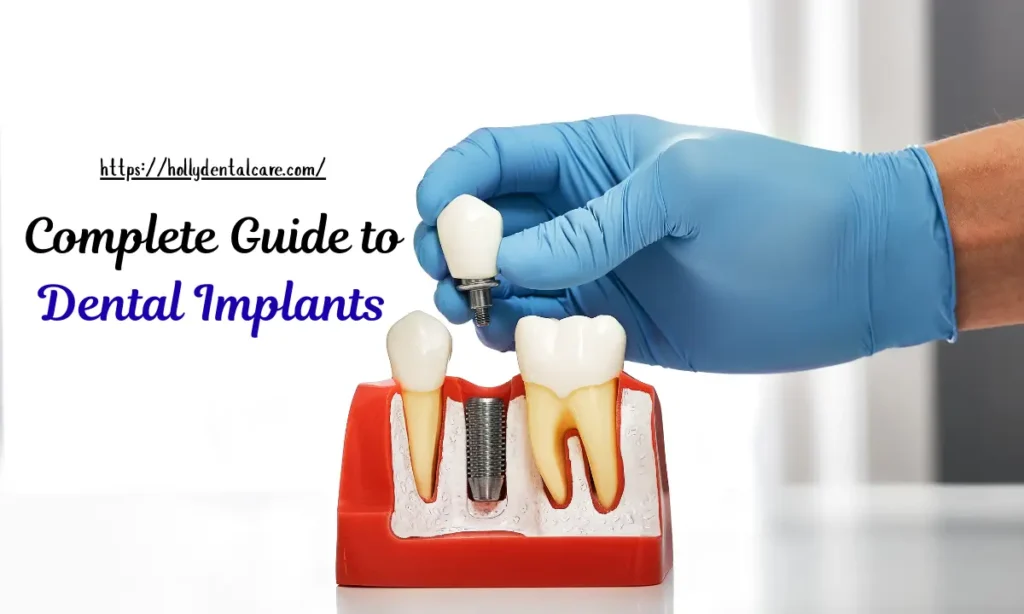Complete Guide to Dental Implants: Dental implantshave changed tooth care a lot. They last long, look real, and work well if you miss teeth. Not like dentures or bridges, implants go deep into the bone of your jaw, giving a strong fix that looks like your own teeth. They are now a big pick for those who want good mouth health and more trust.
Now, patient can pick from many price options. Low-cost fixes like $399 dental implants draw folks looking to save money, while some look at getting dental implants in other lands such as Helvetic Clinics in Hungary, which are known for good care but cost less than in the U.S. or Western Europe.
What Are Dental Implants?
Dental implants are high-end tools made to fill gaps from lost or very bad teeth. They are made up of fake tooth roots, often using a metal named titanium, known for being strong, lasting long, and fitting well with human bone. In a careful surgery, these metal parts are put right into the jawbone. They form a firm base for things like crowns, bridges, or false teeth.
Unlike false teeth that you can take out, dental implants give a steady and lasting fix. They make your smile look better and let you chew well. They also keep the true form of your face and jaw. Since the implant works like a real root, it backs up the bone around it and stops the bone loss that often comes after pulling a tooth out.
How Dental Implants Work
The work of dental implants rests on a body process called osseointegration. Once the titanium piece is put in the jawbone through a cut, the close bone cells start to grow and stick right to the piece’s cover. This sticking can take many weeks to months, where the piece sticks well within the bone, just like a real tooth’s root.
This solid hold makes a strong and fixed base that can hold a dental crown or fake part well without the chance of moving or coming loose. The end is a fake tooth that looks, feels, and works like a real tooth, letting people eat, talk, and smile with sureness. As titanium fits well with the body, the chance of it being turned away or causing an allergy is very low, making dental implants a top choice for tooth swap today.
Types of Dental Implants
There are two main kinds of teeth roots:
- Endosteal Roots: The type we see most, put right into the bone of the jaw. Good for most people who have strong jaw bones.
- Subperiosteal Roots: Set under the gum but on top of the jaw bone, used when the bone is not tall or thick enough.
Who Needs Dental Implants?
Dental implants can change lives for many people, giving a strong fix when other teeth fixes don’t work well.
Common Reasons for Getting Implants
- First, you might need dental implants if you are missing one or more teeth.
- Also, they are great for putting in new teeth when old ones are too hurt or rotten to fix.
- Plus, implants can be a firm choice for people who have wobbly or not comfy false teeth.
- Last, they stop more loss in the jawbone that usually happens after losing teeth.
Ideal Candidates for Implants
- Here, ideal candidates are adults with fully developed jawbones.
- Also, people must be fit and well to heal right.
- Plus, they need strong bones to hold the implant.
- And, if you don’t smoke or can stop while you heal, you’re more likely to do well.
Places such as Nuvia Dental Implants can set you up with new teeth the same day if you fit their rules. This cuts down on waits and makes things easier.
Dental Implant Procedure Step-by-Step
Getting to know how to get a tooth fix can help ease worry and make you set for it.
Initial Consultation and Planning
The dentist takes X-rays and 3D pictures, and checks your mouth health to make a care plan. This part might need bone grafting if necessary.
Surgery and Healing Process
- The implant goes into the jawbone in surgery.
- The time it takes to heal can change (often 3–6 months) as the implant sets into the bone.
- A temp crown or healing cap might be placed during this time.
Final Crown Placement
After the healing ends, a made-for-you crown gets set on the implant, bringing back full use and look.
People who pick care at Dental Implants Hungary Helvetic Clinics often get help from top tech and skilled experts. This makes it a top spot for dental trips.
Cost of Dental Implants
The price of dental implants can change based on where you are, how hard they are to put in, and what they are made of.
Average Prices in the US
- US One tooth fix (with top): $3,000–$5,000
- All mouth full fixes: $20,000–$50,000+
Some places offer cheaper choices like $399 dental implants. Yet, one must make sure that these still meet top care, material, and safety needs.
Factors Affecting Cost
- First, the more implants you need, the more you will pay. More means more money.
- Also, the sort of implant and crown you pick can change in stuff and how good it is, which changes the cost too.
- At times, you may need extra stuff, like bone grafts or sinus lifts. This can make it tougher and more expensive.
- Also, the place and fame of the clinic can shift the cost a lot. The well-known ones often charge more.
- Plus, if you need drugs to sleep or not feel pain during it, this might add to what you have to pay, based on what they use.
To cut down on costs, many go to get their dental implants abroad Helvetic Clinics. They are known for good care, meet global rules, and cost a lot less than in the US and UK.
Pros and Cons of Dental Implants
Pros
- Permanent, long-lasting solution
- Natural appearance and function
- Improved speech and chewing
- No impact on adjacent teeth
- Prevents jawbone deterioration
Cons
- Higher upfront cost
- Requires surgery and healing time
- Not suitable for everyone
- Potential for complications (though rare)
How to Care for Dental Implants
Taking care of your teeth implants is key for them to last long:
- First, you must brush and floss every day to keep the gums around the implant clean.
- Also, pick a soft toothpaste so you don’t hurt the implant or the nearby gums.
- Make sure you go to your dentist often for deep cleans and checks.
- Plus, don’t smoke and stay away from hard foods, as they can hurt the implant and slow down its fix.
- If you grind your teeth when you sleep, think about getting a night guard to shield the implant from too much push.
- Places like Nuvia Dental Implants give care tips to keep your implants in good shape for a long time.
Final Thoughts
Dental implants can shift how you look, how you feel, and how you care for your teeth. If you are checking out top spots like Nuvia Dental Implants, eyeing dental implants at Hungary Helvetic Clinics, or looking for low-cost choices like $399 dental implants, it’s very important to choose a place you can trust and to know the steps very well.
For those who want good care that’s easy on the wallet, Dental Implant abroad Helvetic Clinics remain a top pick for people from all over, mixing top work with cost cuts. By thinking about the good parts, risks, and costs, and looking after them well dental implants can be one of the best ways to keep a strong, happy smile for a long time.
Also read:- Metropolis Labs | BL: A Pioneer in Diagnostic Healthcare



